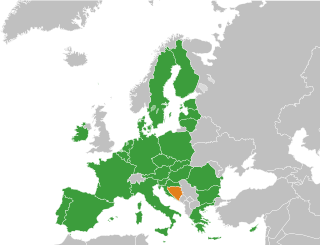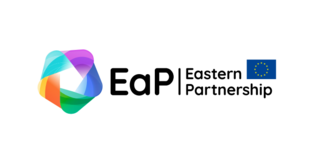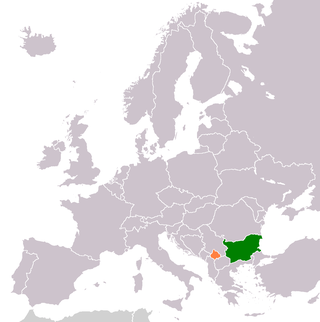
The European Union (EU) has expanded a number of times throughout its history by way of the accession of new member states to the Union. To join the EU, a state needs to fulfil economic and political conditions called the Copenhagen criteria, which require a stable democratic government that respects the rule of law, and its corresponding freedoms and institutions. According to the Maastricht Treaty, each current member state and the European Parliament must agree to any enlargement. The process of enlargement is sometimes referred to as European integration. This term is also used to refer to the intensification of co-operation between EU member states as national governments allow for the gradual harmonisation of national laws.

The accession of Bosnia and Herzegovina to the European Union (EU) is the stated aim of the present relations between the two entities. Bosnia and Herzegovina has been recognised by the European Union as a "candidate country" for accession since the decision of the European Council in 2022 and is on the current agenda for future enlargement of the EU. Bosnia and Herzegovina takes part in the Stabilisation and Association Process and trade relations are regulated by an Interim Agreement.

The accession of Kosovo to the European Union (EU) is on the current agenda for future enlargement of the EU. Kosovo is currently recognized by the EU as a potential candidate for accession.

The Eastern Partnership (EaP) is a joint initiative of the European Union, together with its member states, and six Eastern European countries. The EaP framework governs the EU's relationship with the post-Soviet states of Armenia, Azerbaijan, Belarus, Georgia, Moldova, and Ukraine. The EaP is intended to provide a forum for discussions regarding trade, economic strategy, travel agreements, and other issues between the EU and its Eastern European neighbours. It also aims at building a common area of shared values of democracy, prosperity, stability, and increased cooperation. The project was initiated by Poland and a subsequent proposal was prepared in co-operation with Sweden. It was presented by the foreign ministers of Poland and Sweden at the EU's General Affairs and External Relations Council in Brussels on 26 May 2008. The Eastern Partnership was inaugurated by the EU in Prague, Czech Republic on 7 May 2009.

Austria–Kosovo relations refer to the bilateral relations of Austria and Kosovo. Kosovo has an embassy in Vienna and Austria has an embassy in Pristina.

Belgium–Kosovo relations refer to the bilateral relations of the Kingdom of Belgium and the Republic of Kosovo. Kosovo has an embassy in Brussels and Belgium has a Liaison Office in Pristina.

Bulgaria–Kosovo relations refer to the bilateral relations of Bulgaria and Kosovo.

Italy–Kosovo relations are foreign relations between the Italian Republic and the Republic of Kosovo. Kosovo declared its independence from Serbia on 17 February 2008 and Italy recognised it on 21 February 2008. Italy has an embassy in Pristina since 15 May 2008. Kosovo will open an embassy in Rome. The two countries enjoy friendly relations.

The Union for the Mediterranean is an intergovernmental organization of 43 member states from Europe and the Mediterranean Basin: the 27 EU member states and 16 Mediterranean partner countries from North Africa, Western Asia and Southern Europe. It was founded on 13 July 2008 at the Paris Summit for the Mediterranean, with an aim of reinforcing the Euro-Mediterranean Partnership (Euromed) that was set up in 1995 as the Barcelona Process. Its general secretariat is located in Barcelona, Catalonia, Spain.
Conference of Western Balkan States was a 28 August 2014 conference of heads of states and governments of Western Balkans region initiated by German chancellor Angela Merkel. An idea for organization of conference came in light of the celebration of the 100th anniversary of the beginning of World War I. It is the first conference in this framework and organizers expressed their desire to continue it in future with Vienna and Paris mentioned as a potential next hosts after Berlin. Günther Oettinger confirmed at conference that event will be organised annually with Vienna as a host city in 2015 and Paris in 2016.

The 2015 Western Balkans Summit was the second annual summit of heads of states and governments of Western Balkans. It took place in the Vienna, Austria, following the 2014 Conference of Western Balkan States that took place in Berlin, Germany. This summit forms part of the Berlin Process, a five-year process marked by yearly summits in order to underline the commitment to Future enlargement of the European Union towards the Western Balkans region. Official date of summit is 27 of August 2015. After 2014 conference Günther Oettinger confirmed that the event will be organised annually with Vienna as a host city in 2015 and Paris in 2016.

The Berlin Process is an intergovernmental cooperation initiative linked to the future enlargement of the European Union.

Mikheil Janelidze is a chairman of Center for European Governance & Economy. He is a former Georgian government official who served as Vice Prime Minister (2017–2018), Minister of Foreign Affairs (2015–2018), First Deputy Minister of Foreign Affairs (2015) and Deputy Minister of Economy and Sustainable Development of Georgia (2011-2015).

EU Med, EuroMed 9, or MED9, which is also referred to as "Club Med" and "Med Group", is an alliance of nine Mediterranean and Southern European Union member states: Croatia, Cyprus, France, Greece, Italy, Malta, Portugal, Slovenia and Spain. They are part of the Mediterranean Basin. All nine countries are states of the European Union, part of the eurozone, and all except Cyprus are part of the unbounded Schengen Area.

The 2017 Western Balkans Summit in Trieste, Italy was the fourth annual summit within the Berlin Process initiative for European integration of Western Balkans states. Previous summits took place in Berlin in 2014, Vienna in 2015 and in Paris in 2016. Heads of government, foreign ministers and the ministers of economy of Albania, Bosnia and Herzegovina, Kosovo, Republic of Macedonia, Montenegro, Serbia, as well as EU member states from the region Croatia, Slovenia and EU member states Austria, France, Germany, Italy as well as representatives of the European Union and the International Financial Institutions attended. Participants once again committed the Western Balkan's eventual path into the EU and agreed the next Berlin Process Summit would take place in London.

Albania–Germany relations are the bilateral relations between Albania and Germany.

The 2018 Western Balkans Summit in London, United Kingdom, was the fifth annual summit within the Berlin Process initiative for European integration of Western Balkans states. The summit took place on 9–10 July. Previous summits took place in Berlin in 2014, Vienna in 2015, Paris in 2016 and Trieste in 2017. Heads of government, foreign ministers and the ministers of economy of Albania, Bosnia and Herzegovina, Kosovo, Republic of Macedonia, Montenegro, Serbia, as well as EU member states from the region Croatia, Slovenia and EU member states such as the United Kingdom, Austria, France, Germany, Italy as well as representatives of the European Union and the International Financial Institutions attended the summit.

This article outlines the history of the Common Security and Defence Policy (CSDP) of the European Union (EU), a part of the Common Foreign and Security Policy (CFSP).

The 2019 Western Balkans Summit in Poznań, Poland, was the sixth annual summit within the Berlin Process initiative for European integration of Western Balkans states. Heads of government, foreign ministers, and the ministers of economy from Albania, Bosnia and Herzegovina, Kosovo, North Macedonia, Montenegro, and Serbia attended, as well as two existing EU member states from the region - Croatia and Slovenia. In addition, other EU member states including Austria, France, Germany, and Italy, as well as representatives of the European Union and the International Financial Institutions, attended to the summit.

The 2022 EU–Western Balkans summit was the fourth edition of the European Union–Western Balkans summit held on 6 December 2022 in Tirana, Albania. Hosted by the Albanian Prime Minister, Edi Rama, the summit brought together heads of state and government from the Western Balkan nations, including Bosnia and Herzegovina, Kosovo, Montenegro, North Macedonia, and Serbia, alongside other EU representatives. Amid the setting of the ongoing Russo-Ukrainian War, it underscored the union's commitment to strengthening its political, economic, and security cooperation with the region. Among the central themes of the discussions was the union's support for the region's integration, particularly through the alignment of the Western Balkans with EU standards. The Tirana Declaration, one of the summit's key results, reaffirmed the EU's dedication to the region's EU accession process, while highlighting the demand for political and institutional reforms and democratic principles.

















